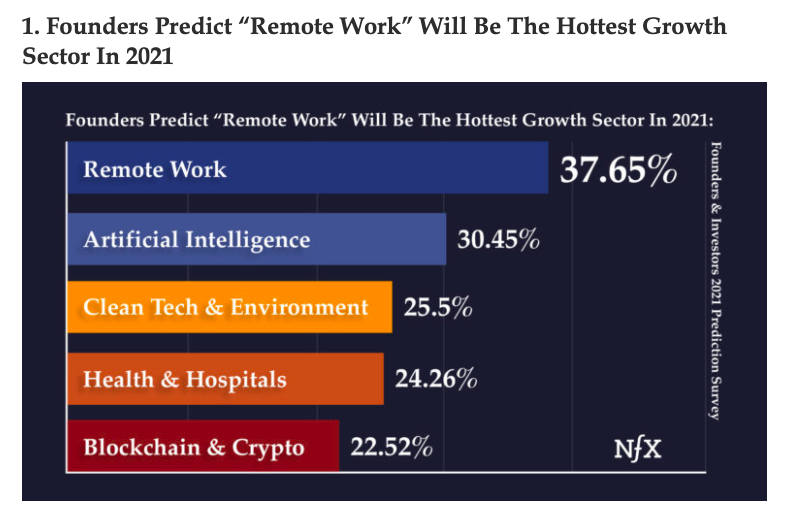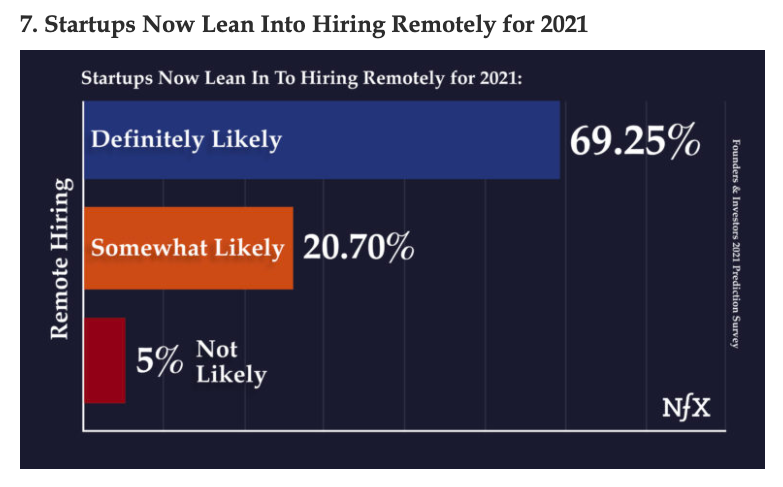Happy New Year everyone, and welcome to the first This Week in Remote Work of 2021! If this is your first time joining us, here’s the rundown: each Friday we compile five remote work articles that stood out to us that week and provide a quick summary/commentary. With thousands of articles being written about remote work each week, this is our way of calling attention to a few articles that we found interesting – ranging from more technical topics like digital workspaces to broader trend pieces covering the future of  work.
work.
Hopefully you find this helpful, and if so, please share. And ping us anytime on LinkedIn or Twitter to share any articles you found particularly interesting this week.
With that, here’s This Week in Remote Work:
1) Survey Results: 14 VC & Founder Predictions for 2021 (from VC firm NfX)
In December, VC firm NFX surveyed 526 founders & investors in the startup community for their thoughts on the top trends for 2021. There are a lot of interesting trends and predictions covered throughout the report, but right off the bat at #1 is that “Founders Predict Remote Work Will Be The Hottest Growth Sector In 2021.”

Prediction #7 also jumped out at me, showing the change in opinion that companies have when it comes to hiring remote talent. The article sites unfavorable opinion of hiring remote employees at the beginning of the pandemic, but just 9 months later almost 70 of companies said they were “definitely likely” to lean into hiring remotely in 2021.

Overall, half of the predictions covered in this report touch on Remote Work in some way – including predictions on when people will return to the office, VC sentiment on Remote Work startups, and more. Give it a read here.
2) Jim Cramer reveals his 10 investment themes for 2021 (CNBC’s Mad Money)
On the first Monday of the New Year CNBC’s Jim Cramer took the opportunity to share his wisdom about picking stock in 2021, and the central tenet of his advice was to pay attention to themes.
“I always fall back on themes. That’s the best way to approach a sell-off, like we had today,” he said. “It’s these long-term themes that work the best.”
Cramer then goes on to list the top 10 long term themes that he recommends as a guide for investing, with one of those themes being Remote Work:

This is particularly interesting because it provides a different perspective on the prediction that Remote Work is here to stay. We hear that a lot from tech pundits and – of course – people who’s technology enables Remote Work (we’re certainly guilty of that prediction here at Cameyo, of course), but for Remote Work to be recognized as a long term-term theme that will drive investment strategy in 2021 and beyond – that’s very interesting.
3) Businesses to boost collaboration spending in ‘21 as remote work continues (Computerworld)
Citing multiple surveys and research reports from analyst firms IDC, 451 Research, and Nemertes Group, this article has a TON of great stats about Remote Work and its impact on IT spending in 2021. Overall the data points a very clear picture that organizations of all sizes are planning to spend more in 2021 to enable better, more productive, and more secure Remote Work.
Here’s jut a quick overview of some of the stats I found most interesting:
- “Even with vaccinations offering hope for something of a return to normal in the year ahead, remote work will remain a necessity for many organizations. More than half (54%) of respondents to a Pew survey published this month said they want to work from home “all or most of the time” when the coronavirus outbreak is over, while a third would do so “some of the time.” Only 11% say they’d want to do this “rarely or never.””
- “Data from analyst firm IDC indicates that around half of businesses globally (48%) expect to increase spending on collaboration software in 2021, according to a recent survey report.”
- “451 Research’s found that nearly four in five respondents expect their organizations to either maintain or increase spending across categories that include content storage and sharing tools (85%), video collaboration (84%), remote work equipment and peripherals (83%), digital workspace (80%), team messaging and collaboration (79%) and unified communications (77%).”
- “During 2021, many businesses expect to support a greater mix of remote and in-office staff, often referred to as a “remote hybrid strategy.” A Gartner survey earlier this year indicated that, in the longer term, 82% of business will let staff work remotely some of the time.”
This article is definitely worth a full read through, but overall there is no denying that all of the data from multiple analyst firms, surveys, and reports shows that Remote Work is now being considered a long-term reality that now needs to be budgeted for.
4) Taking a pay cut to work from home forever? Three quarters of workers would jump at the chance (TechRepublic)
Not to beat a dead horse about Remote Work being a long-term trend, but I included this story because it provides a really interesting third dimension to the long-term Remote Work discussion – the employees’ view and preferences. We’ve already seen that financial analysts, technology analysts, company founders, VCs, and IT personnel all believe that Remote Work will be a long-term trend. But what about what employees want?
I don’t think there’s any clearer indication I’ve seen of employee preference for Remote Work than the headline stat of this article:
Office workers would be willing to sacrifice up to 20% of their salary in return for a fully remote role that allowed them to work from anywhere. A poll of 1,000 office workers in the UK conducted by OnePoll on behalf of Citrix found that three-quarters (75%) of employees would accept a pay cut in return for a job that allowed them to work remotely.
It’s one thing for employees to say that they’d prefer to work from home, or at least to have the flexibility to work from home sometimes. But the fact that people would be willing to accept up to 20% reduction in pay in exchange for a fully remote role leaves no room for ambiguity. Moving forward, people are going to demand this type of flexibility. And if their company won’t give it to them, they’ll leave – even accepting a substantial paycut – to go to a company that does.
5) After embracing remote work in 2020, companies face conflicts making it permanent (VentureBeat)
To provide a bit of a balance to the avalanche of stories this week talking about the benefits and inevitability of long-term Remote Work, this article does a great job of unpacking the future of work while realistically addressing the fact that there are still plenty of executives who are NOT a fan of Remote Work (Netflix’s CEO Reed Hastings is cited as one very prominent opponent).
“If I had to guess, the five-day workweek will become four days in the office while one day is virtual from home,” Hastings said.
But after acknowledging some examples of why execs oppose Remote Work, the article dives deep into the premise that, at this point, there are far too many benefits of Remote Work that companies simply can’t ignore. This leads to a great conversation and breakdown of all the things that businesses need to address to fully tap into these benefits. It covers everything from how Remote Work opens up a vastly larger talent pool for companies, how it can improve efficiency, cost savings, and more.
In particular, what impressed me most about this article was the balance it was able to strike about the benefits of Remote Work while at the same time acknowledging that there are still valid concerns out there from some execs who aren’t fully sold on the long-term viability. Definitely worth a read.
Thank you for joining us for This Week in Remote Work, and be sure to meet us back here next Friday for the next edition.
